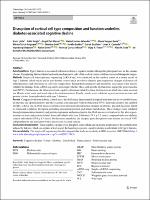Disruption of cortical cell type composition and function underlies diabetes-associated cognitive decline
Autor/a
Data
2023-08Enllaç permanent
https://hdl.handle.net/11351/10037DOI
10.1007/s00125-023-05935-2
ISSN
1432-0428
PMID
37351595
Paraules clau
Declivi cognitiu; Còrtex; MetabolismeCitació recomanada
Little K, Singh A, Del Marco A, Llorián-Salvador M, Vargas-Soria M, Turch-Anguera M, et al. Disruption of cortical cell type composition and function underlies diabetes-associated cognitive decline. Diabetologia. 2023 Aug;66:1557–75.
Audiència
Professionals
Aquest element apareix a les col·leccions següents
- HVH - Articles científics [4476]
- VHIR - Articles científics [1751]
Els següents fitxers sobre la llicència estan associats a aquest element:

 Àrea privada
Àrea privada Contacte
Contacte








